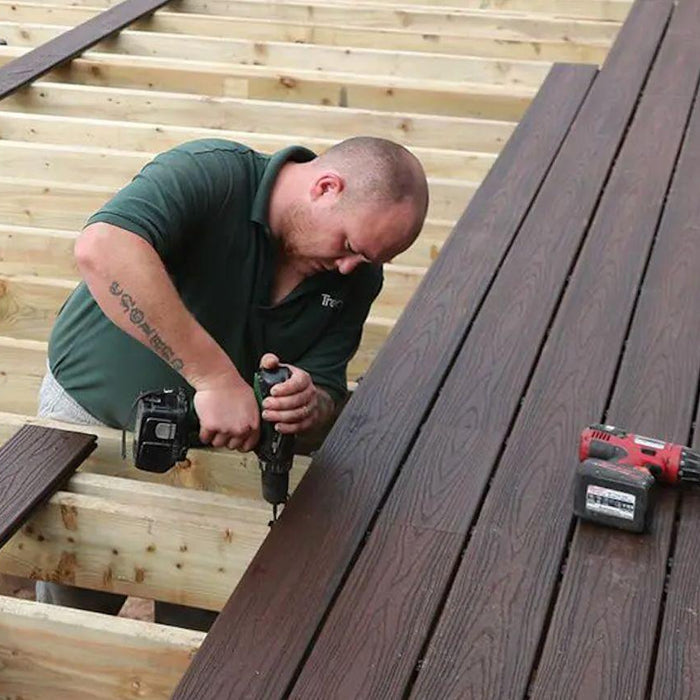Pros and Cons of Different Timber Treatments

Have you ever admired the warm, natural beauty of a timber pergola basking in the sunlight of an English garden? Or perhaps you've been impressed by the enduring solidity of a wooden deck underfoot, holding its own against the shifting seasons? Timber, with its blend of aesthetic appeal and structural resilience, has long been a favourite in both construction and design. However, the secret behind its longevity and visual appeal often lies in the type of timber treatment it undergoes. Whether you're considering installing a timber pergola from our range of garden structures or upgrading your decking with 32x150 decking boards, understanding the pros and cons of different treatments is essential.
What is Timber Treatment?
Timber treatment involves applying specific processes and chemicals to wood to protect it from pests, rot, and environmental wear and tear. This not only prolongs the timber's life but also enhances its functionality and appearance.
Why is Timber Treatment Important?

Imagine investing in stunning 38x125 Tanalised Treated Loglap Cladding only to discover unsightly rot or insect damage a few years down the line. Timber treatment helps avoid such scenarios, ensuring that your timber investments, whether cladding or decking boards, remain in pristine condition.
Types of Timber Treatments
There's a wide range of timber treatments available, each with unique characteristics, advantages, and drawbacks.
Preservative Treatments
Pressure-Treated Timber

Pressure treatment is one of the most common methods for preserving timber. During this process, wood is placed in a vacuum and then exposed to preservatives under high pressure.
Pros:
-
Longevity: Protects against decay and insect infestation.
-
Durability: Increases structural integrity, ideal for outdoor projects.
-
Cost-Effective: Generally less expensive due to its wide availability.
Cons:
-
Appearance: May alter the timber's hue to a greenish shade.
-
Initial Wetness: Can be damp straight after treatment, requiring drying time.
For decking projects, our 32x150 Decking Boards utilise pressure treatment, ensuring both beauty and resilience.
Tanalised Timber

Similar to pressure treatment, tanalising involves infusing the wood with preservatives, offering robust protection.
Pros:
-
Increased protection: Offers a higher resistance to elements.
-
Versatility: Can be used in various applications from fencing to loglap cladding.
Cons:
-
Chemicals: Some users express concern over chemical usage.
-
Uniform Colour: May not suit those seeking natural colour variations.
Surface Coatings
Oil-Based Treatments

Applying oils such as tung or linseed oil can enhance the wood's grain and provide a layer of protection.
Pros:
-
Natural Finish: Popular for maintaining the natural beauty of timber.
-
Hydrophobic Properties: Repels water effectively.
Cons:
-
Maintenance: Requires regular reapplication, especially in weather-exposed areas.
-
Limited Pest Protection: Doesn't protect against insects or fungi as effectively as preservatives.
For pergolas, using oil treatments can intensify the natural allure of the timber, a feature that our timber garden pergolas highlight.
Paints and Stains
Staining
Staining enhances wood appearance while offering a degree of protection.
Pros:
-
Colour Range: Wide variety of hues available, allowing customisation.
-
UV Protection: Shields against sun damage.
Cons:
-
Limited Durability: Will not last as long as paints or preservatives.
-
Annual Maintenance: Requires regular touch-ups for continued protection.
Paint
While not a traditional treatment, paint provides a robust protective barrier.
Pros:
-
Comprehensive Protection: Covers wood, protecting it from UV rays and moisture.
-
Decorative: Offers vibrant colour options.
Cons:
-
Peeling and Chipping: Over time, exposure can cause unsightly wear.
-
Labour-Intensive: Requires regular maintenance to maintain its aesthetic.
Specialised Treatments
Fire-Retardant Treatments
Fire safety is vital, especially with timber structures, which makes fire-retardant treatments invaluable.
Pros:
-
Safety: Reduces fire risk, increasing safety.
-
Compliance: Meets building regulation standards.
Cons:
-
Cost: Generally more expensive due to the specialised nature.
-
Altered Finish: Can change the appearance of the timber.
Breathable Membranes

While not a direct timber treatment, incorporating products like the Strotex Breathable Membrane offers additional protection. These membranes prevent water ingress while allowing any moisture within the structure to escape, ensuring longevity and preventing rot.
Pros:
-
Moisture Management: Reduces internal condensation.
-
Extended Lifespan: Enhances overall structural integrity.
Cons:
-
Installation Required: Professional installation may be necessary for optimal results.
-
Additional Cost: Adds to the project budget.
Installing Timber Products: A Seamless Process

Selecting the right treatment is only part of the journey. When it comes to installation, efficiency and reliability are key. At TimberDIY, we pride ourselves on providing timely delivery and expert guidance. When planning to enhance your outdoor space with products such as our timber garden pergolas, we ensure that your experience from purchase to installation is seamless.
Unique Selling Points of TimberDIY

Choosing TimberDIY isn't just about acquiring high-quality products—it's about enjoying an experience:
-
Quality Assurance: Every product, from hardwood faced plywood to decking boards, is crafted to meet rigorous standards.
-
Extensive Expertise: Our team possesses comprehensive knowledge to guide you in choosing the best treatment and products.
-
Customer-Centric Approach: We're dedicated to ensuring our customers are satisfied at every step.
For further insights and to explore our full range of products, visit our website.
In conclusion, understanding timber treatments is paramount, not just for protection but also to enhance and sustain the natural beauty and functionality of wood. Whether you're updating your garden with a pergola or selecting the right cladding, knowing the pros and cons of each treatment helps you make informed decisions that match your tastes and project needs. Here's to many years of enjoying the splendour and durability of timber in all your creative endeavours!









